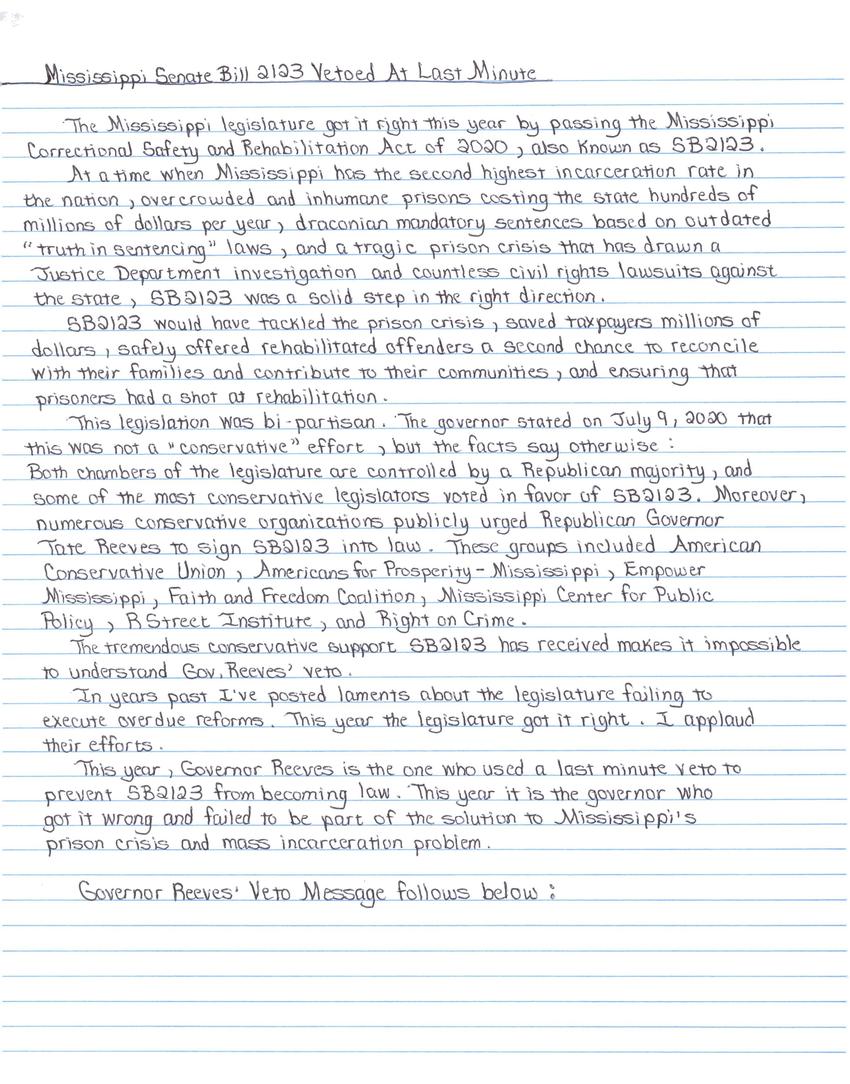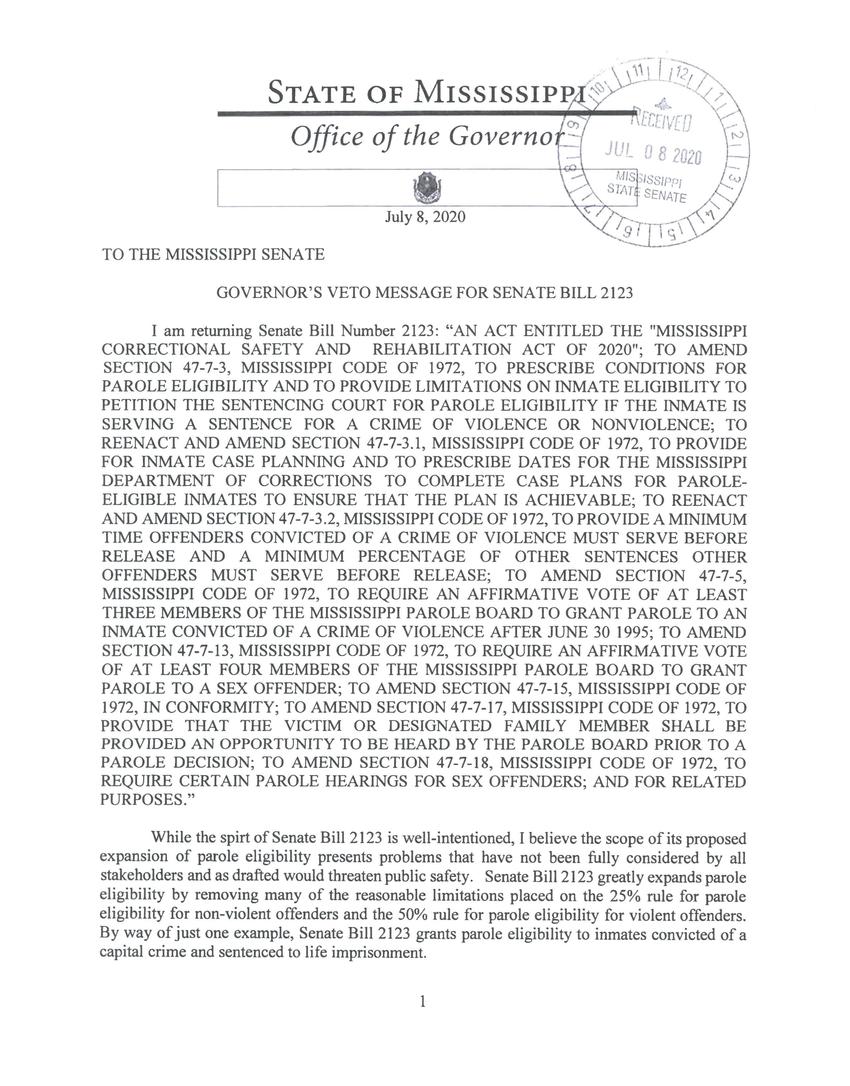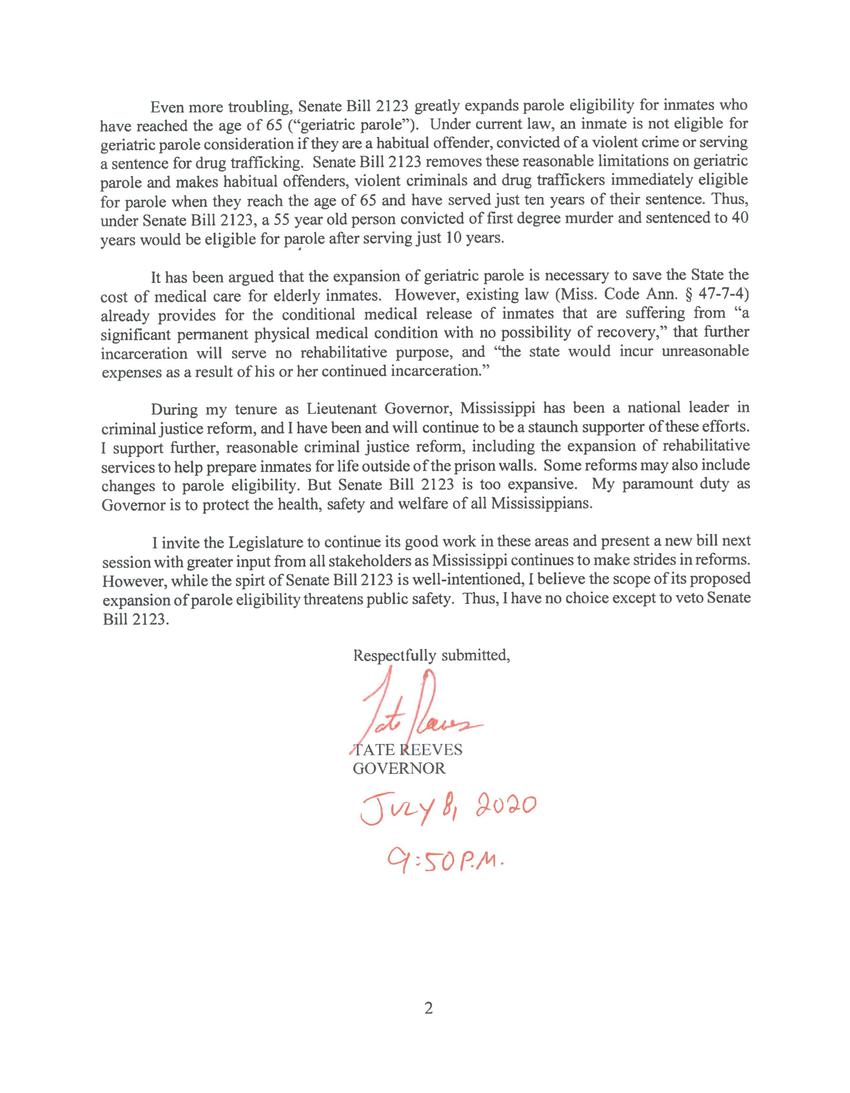
Transcription
Mississippi Senate Bill 2123 Vetoed At Last Minute
The Mississippi legislature got it right this year by passing the Mississippi Correctional Safety and Rehabilitation Act of 2020, also known as SB2123. At a time when Mississippi has the second highest incarceration rate in the nation, overcrowded and inhumane prisons costing the state hundreds of millions of dollars per year, draconian mandatory sentences based on outdated "truth in sentencing" laws, and a tragic prison crisis that has drawn a Justice Department investigation and countless civil rights lawsuits against the state, SB2123 was a solid step in the right direction.
SB2123 would have tackled the prison crisis, saved taxpayers millions of dollars, safely offered rehabilitated offenders a second chance to reconcile with their families and contribute to their communities, and ensuring that prisoners had a shot at rehabilitation.
This legislation was bi-partisan. The governor stated on July 9, 2020 that this was not a "conservative" effort, but the facts say otherwise:
Both chambers of the legislature are controlled by a Republican majority, and some of the most conservative legislators voted in favor of SB2123. Moreover, numerous conservative organizations publicly urged Republican Governor Tate Reeves to sign SB2123 into law. These groups included American Conservative Union, Americans for Prosperity- Mississippi, Empower Mississippi, Faith and Freedom Coalition, Mississippi Center for Public Policy, R Street Institute, and Right on Crime.
The tremendous conservative support SB2123 has received makes it impossible to understand Gov. Reeves' veto.
In years past I've posted laments about legislature failing to execute overdue reforms. This year the legislature got it right. I applaud their efforts.
This year, Governor reeves is the one who used a last minute veto to prevent SB2123 from becoming law. This year it is the governor who got it wrong and failed to be part of the solution to Mississippi's prison crisis and mass incarceration problem.
Governor Reeves' veto message follows below:
TO THE MISSISSIPPI SENATE
GOVERNOR'S VETO MESSAGE FOR SENATE BILL 2123
I am returning Senate Bill Number 2123: "AN ACT ENTITLED THE "MISSISSIPPI CORRECTIONAL SAFETY AND REHABILITATION ACT OF 2020"; TO AMEND SECTION 47-7-3, MISSISSIPPI CODE OF 1972, TO PRESCRIBE CONDITIONS FOR PAROLE ELIGIBILITY AND TO PROVIDE LIMITATIONS ON INMATE ELIGIBILITY TO PETITION THE SENTENCING COURT FOR PAROLE ELIGIBILITY IF THE INMATE IS SERVING A SENTENCE FOR A CRIME OF VIOLENCE OR NONVIOLENCE; TO REENACT AND AMEND SECT 47-7-3.1, MISSISSIPPI CODE OF 1972, TO PROVIDE FOR INMATE CASE PLANNING AND TO PRESCRIBE DATES FOR THE MISSISSIPPI DEPARTMENT OF CORRECTIONS TO COMPLETE CASE PLANS FOR PAROLE-ELIGIBLE INMATES TO ENSURE THAT THE PLAN IS ACHIEVABLE; TO REENACT AAND AMEND SECTION 47-47-3.2, MISSISSIPPI CODE OF 1972, TO PROVIDE A MINIMUM TIME OFFENDERS CONVICTED OF A CRIME OF VIOLENCE MUST SERVE BEFORE RELEASE AND A MINIMUM PERCENTAGE OF OTHER SENTENCES OTHER OFFENDERS MUST SERVE BEFORE RELEASE; TO AMEND SECTION 47-7-5, MISSISSIPPI CODE OF 1972, TO REQUIRE AN AFFIRMATIVE VOTE OF AT LEAST THREE MEMBERS OF THE MISSISSIPPI PAROLE BOARD TO GRANT PAROLE TO AN INMATE CONVICTED OF ACRIME OF VIOLENVE AFTER JUNE 30 1995; TO AMEND SECTON 47-7-13, MISSISSIPPI CODE OF 1972, TO REQUIRE AN AFFIRMATIVE VOTE OF AT LEAST FORU MEMBERS OF THE MISSISSIPPI PAROLE BOARD TO GRANT PAROLE TO A SEX OFFENDER; TO AMEND SECTION 47-7-15, MISSISSIPPI CODE OF 1972, IN CONFORMITY; TO AMED SECTION 47-7-17, MISSISSIPPI CODE OF 1972, TO PROVIDE THAT THE VICTIM OR DESIGNATED FAMILY MEMBER SHALL BE PROVIDED AN OPPORTUNITY TO BE HEARD BY THE PPAROLE BOARD PRIOR TO A PAROLE DECISION; TO AMEND SECTION 47-7-18, MISSISSIPPI CODE OF 1972, TO REQUIRE CERTAIN PAROLE HEARINGS FOR SEX OFFENDERS; AND FOR RELATED PURPOSES."
While the spirt of Senate Bill 2123 is well-intentioned, I believe the scope of its proposed expansion of parole eligibility presents problems that have not been fully considered by all stakeholders and as drafted would threaten public safety. Senate Bill 2123 greatly expands parole eligibility by removing many of the reasonable limitations placed on the 25% rule for parole eligibility for non-violent offenders and the 50% rule for parole eligibility for violent offenders. By way of just one example, Senate Bill 2123 grants parole eligibility to inmates convicted of a capital crime and sentenced to life imprisonment.
Even more troubling, Senate Bill 2123 greatly expands parole eligibility for inmates who have reached the age of 65 ("geriatric parole"). Under current law, an inmate is not eligbile for geriatric parole consideration if they are a hibutal offender, convicted of a violent crime or serving a sentence for drug trafficking. Senate Bill 2123 removes these reasonable limitations on geriatric parole and makes habitual offenders, violent criminals and drug traffickers immediately eligbile for parole when they reach the age of 65 and have served just ten years of their sentence. Thus, under Senate Bill 2123, a 55 year old person convicted of first degree murder and sentenced to 40 years would be eligible for parole after serving just 10 years.
It has been argued that the expansion fo geratric parole is necessary to save the State the cost of medical care for elderly inmates. However, existing law (Miss. Code Ann. & 47-7-4) already provides for the conditional medical release of inmates that are suffering from "a significant permanent physical medical condition with no possibility of recovery," that further incarceration will serve no rehabilitative purpose, and "the state would inur unreasonable expenses as a result of his or her continued incarceration."
During my tenure as Lieutenant Governor, Mississippi has been a national leader in criminal justice reform, and I have been and will lcontineu to be a staunch supporter of these efforts. I support further, reasonable criminal justice reform, including the expansion of rehabilitative services to help prepare inamtes for life outside of the prison walls. Some reforms may also include changes to parole eligibility. But Senate Bill 2123 is too expansive. My paramount duty as Governor is to protect the health, safety and welfare of all Mississippians.
I invite the Legislature to continue its good work in these areas and present a new bill next session with greater input from all stakeholders as Mississippi continues to make strides in reforms. However, while the spirt of Senate Bill 2123 is well-intentioned, I believe the scope of its proposed expansion of parole eligibility threatens public safety. Thus, I have no choice except to veto Senate Bill 2123.
Respectfully submitted,
TATE REEVES
GOVERNOR
JULY 8, 2020
9:50 P.M.
Other posts by this author
|
2023 may 31

|
2023 mar 20

|
2022 aug 23

|
2022 aug 23

|
2022 aug 23

|
2022 aug 23

|
More... |




Replies